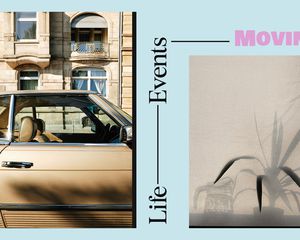On an ordinary Thursday last March, I was already having my second cup of coffee before the sun had finished rising. By 7:30 a.m., I was dressed, groomed, and sitting on a crowded train bound for Manhattan. It was a routine I’d repeated so many times, I was basically running on autopilot from the moment I woke up until I arrived at my desk. I had my daily commute down to an almost perfect science—and then after that March morning, I never did it again.
Currently, after a year and a half of working from home, it’s hard for me to imagine how I successfully completed this routine day in and day out. The thought of putting on jeans before 8 a.m. is borderline terrifying to me now, and I can’t fathom how I used to have the time (or motivation) to pack a full lunch before my hour journey to work.
When office reopening plans started arriving in my inbox, the mild panic I felt about returning to my daily commute almost superseded my excitement about seeing my coworkers again. Couple this with the fact that COVID cases are once again on the rise, and it's unclear whether returning to the office in a month or so will even be on the docket. While I can’t say I was particularly fond of my commute before, it was also never something I dreaded, but now, it's become a major source of anxiety.
Unsplash/Design by Cristina Cianci
“Prior to the pandemic, your commute was probably not something you gave much thought to; almost a muscle memory process due to years of experience,” says Alison Stone, LCSW, a New York-based holistic psychotherapist. “Now, it's likely been over a year since we did that daily trip, so it feels more daunting given the collective trauma of the pandemic and its consequences.”
Even before we took an extended break from the daily hustle, science has shown that a long commute can have a serious impact on our overall well-being. A 2017 study found that adding 20 minutes to your commute has the same negative effect on job satisfaction as receiving a 19% pay cut. And since many commutes were shortened to under a minute during the pandemic (or however long it takes you to walk from your bed to your workstation), this effect could be amplified tenfold when we return to our old routines.
Plus, after spending so much time in our own spaces, where we hold power over everything from the noise level to the temperature, we’re being forced to relinquish that control. “Whenever there's a shift in routine, it can be jarring,” says Stone. “Even though a person may have commuted for a decade straight and ‘should’ be used to it, it's still a big change that will take our brains some time to recalibrate.” We’re also not returning to the same commuting conditions we once knew. After the pandemic, we’re thinking about our exposure to germs, being in enclosed spaces, and our proximity to strangers—all standard elements of most commutes—far more than we were before.
When I consider my current morning routine, where I rise at my leisure, make myself a frothy latte, and begin my work day simply by opening my laptop, it can be hard to imagine going back to my previous schedule. However, after a recent trial run, I’ve decided I found a way to tolerate, and maybe even enjoy, returning to my daily commute: by romanticizing it.
:max_bytes(200000):strip_icc()/romancing-commute-vertical-1-e14c6388789747e196bf444d94d8a087.jpg)
Unsplash/Design by Cristina Cianci
Like many of my endeavors these days, the idea came from TikTok, which has taught me that it’s possible to romanticize everything from rainy days to avocado toast. To romanticize something is to focus on the positives, as if you were distilling your life into a movie trailer. On TikTok, users who participate in the #27videoschallenge—which has over 37.8 million views and counting—post a series of random video clips from their daily lives. Strung together and set to music, these 27 snapshots can make even the most ordinary activities seem more appealing.
It’s a concept that might be easy to dismiss when it comes to commuting—the notion that the New York City transit system could be glamorous doesn’t arrive easily. However, I think that by leaning into all of the best aspects of a commute (in Manhattan or otherwise), we can start to focus on what we’re gaining back rather than what we’re losing when we return to the office.
“Having the right mindset around your commute can change everything,” says Alexa Darrow, a certified Life Enhancement and Mindset Coach. “I've always loved thinking of my commute as my own personal daily escape.” Instead of viewing it as a hassle or annoyance, think of your commute as uninterrupted time for you to enjoy the things you love.
“When we're home or at the office, we have other responsibilities to tend to, but on a commute, our only responsibility is making it from point A to point B safely” she explains. “We get to decide how to use that time.”
Darrow suggests using your commute to focus on activities that will “fill your cup” before you start your work day. For her, that means stopping at her favorite coffee shop to treat herself and see some new faces on her way to work. For others, that might mean playing your favorite music or listening to a podcast or audio book. Anything that can help you view the commute more positively or offer a distraction is fair game, says Dr. Sanam Hafeez, a Neuropsychologist and a member of Byrdie's Beauty and Wellness Review Board.
“It would also help to use that time to catch up with friends or family that you haven’t spoken to in a while,” she says. “Talking to the people we love before work allows us to start the day on a positive note and gives us something meaningful to do during the commute.”
:max_bytes(200000):strip_icc()/romancing-commute-vertical-2-da77a93b7f984fa988acccde2d91bc3c.jpg)
Unsplash/Design by Cristina Cianci
For me personally, the best way to romanticize my commute is to remind myself of all the parts I missed during the pandemic: window shopping on my walk to the office, stopping at my favorite bakery in Grand Central, eavesdropping on the subway. The biggest commuting benefit that I took for granted, however, was having a barrier between work and the rest of my time. At home, it’s all too easy to allow the work day to blend into off hours when there’s no transition between the two.
“We need those boundaries between work and our personal lives now more than ever, and for some of us, our commute is the only time of the day we get to decompress in between,” says Darrow. Our morning commute helps us gradually ease into work mode, while our evening one gives us time to unwind before the rest of our night begins. During the pandemic, some people even started implementing fake commutes to try to establish the boundary that was blurred by remote work.
Recently, on my first day back to the office since last March, I tried putting this new commuting mindset into practice. Heeding Darrow’s advice, I treated myself to an overpriced latte, cued up Spotify’s My Life Is a Movie playlist (I highly recommend it), and focused on enjoying the sensation of being around other people. I even rewatched the opening credits of The Devil Wears Prada on my train ride for inspiration, since it’s arguably the best example of a romanticized—though wildly unrealistic—commute.
Yes, there were moments that threatened to derail my positive mentality: I wore a new pair of sandals that wreaked havoc on my feet, and a subway delay caused me to nearly miss my train home. But as I sprinted through Grand Central towards my track, I realized it was the closest I’d come to feeling like my normal, pre-pandemic self in a long time. I had been wrong when I’d imagined that my return to commuting would feel like I was giving something up. In reality, it did the complete opposite: it gave me something to look forward to. So while it's still unclear when we'll be returning to the office at a regular cadence, at least I'm armed with some feel-good measures to help me enjoy the ride.
:max_bytes(150000):strip_icc()/Landingpage_hero_desktop-059cef5b387f4b40a3e1b4e31519834e.jpg)
:max_bytes(150000):strip_icc()/B-Sides_recirc1-981112ed82194a159178859896a85e55.jpg)
:max_bytes(150000):strip_icc()/managingsocialanxiety-RECIRC-fade19be96c54fbaa235c1bc61c6fe64.jpg)
:max_bytes(150000):strip_icc()/_USE-New-Edit-postcovidasian-RECIRC-fdd70af9dc784611be0525f8663aed3e.jpg)
:max_bytes(150000):strip_icc()/StatmentLip-RECIRC-2d4fa5792c5f43f18259f82eca700f3d.jpg)
:max_bytes(150000):strip_icc()/Gratitude-RECIRC-03f0d8b15a6845058bb2931fe8b84d1d.jpg)
:max_bytes(200000):strip_icc()/romancing-commute-PrimarySF-4ce0582eecb84b46852a62bc27b06d95.jpg)
:max_bytes(150000):strip_icc()/romancing-commute-FullBleed-1-ad46641de9b646ee9a5d4dcb06559707.jpg)





